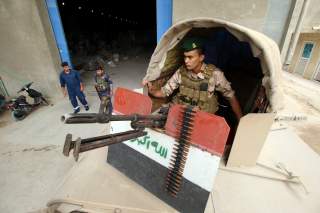Iraq Is Back?
Baghdad is struggling to recover from its widescale battle with Islamic extremists.
Anger at the perception of Iranian meddling in Iraq has galvanized some of the protests in the south. In Najaf protesters called the Dawa party “Safavids,” a reference to Iran’s Safavid empire of the seventeenth century and a term sometimes used as a slur against Iranian-backed Shi’ite militias.
How can Iraq recover from the twin challenges of protests in the south and insurgency by ISIS? The protesters want an end to corruption and increased public services now that the war with ISIS is over. Yet the war with ISIS is not over and the government appears incapable of delivering stability or improved services. The U.S.-led coalition is busy conducting anti-ISIS operations in Syria on the Iraq border while Iraq deploys elite counter-terror forces against protesters. Western powers that have invested heavily in Iraq have been absent and quiet during the protests. This dovetails with a general unwillingness to confront the problems pointed out over the past year in the Inspector General reports, including increased Iranian threats to U.S. interests and training problems.
Notably absent from the protests is Muqtada al-Sadr who led a similar mass protest that took over parliament in 2016, and who is supposed to be the country’s next powerbroker. Grand Ayatollah Ali al-Sistani has supported the demonstrations, but overall they are leaderless and have not backed any major political leader in Iraq. This will make it more difficult for a coalition government to be formed. A Kurdish delegation seeking to discuss the next government was reportedly told not to waste time coming to Baghdad during the current crises on July 15.
The argument in Washington behind more foreign-military financing and train-and-equip programs for Iraq has been that the country needs stability after ISIS to make sure extremists do not emerge again. A corollary to that is that supporting Kurdish parties, Abadi or even Sadr might help slowly wean Iraq from Iran’s influence. The problem is that the systemic problems facing Iraq before the rise of ISIS in 2014 are still widely extent. Billions in support has not led to changes and Iraq may be as unstable in 2018 and unsure of its future as it has been since 2003.
Seth J. Frantzman is a Jerusalem-based journalist who holds a PhD from the Hebrew University of Jerusalem. He is the executive director of the Middle East Center for Reporting and Analysis and a writing fellow at Middle East Forum. Follow him on Twitter at @sfrantzman.
Image: Elements of the Iraqi army and police stand guard at a warehouse of Iraqi's Independent High Electoral Commission in Basra, Iraq May 3, 2018. Picture taken May 3, 2018. REUTERS/Essam al-Sudani

